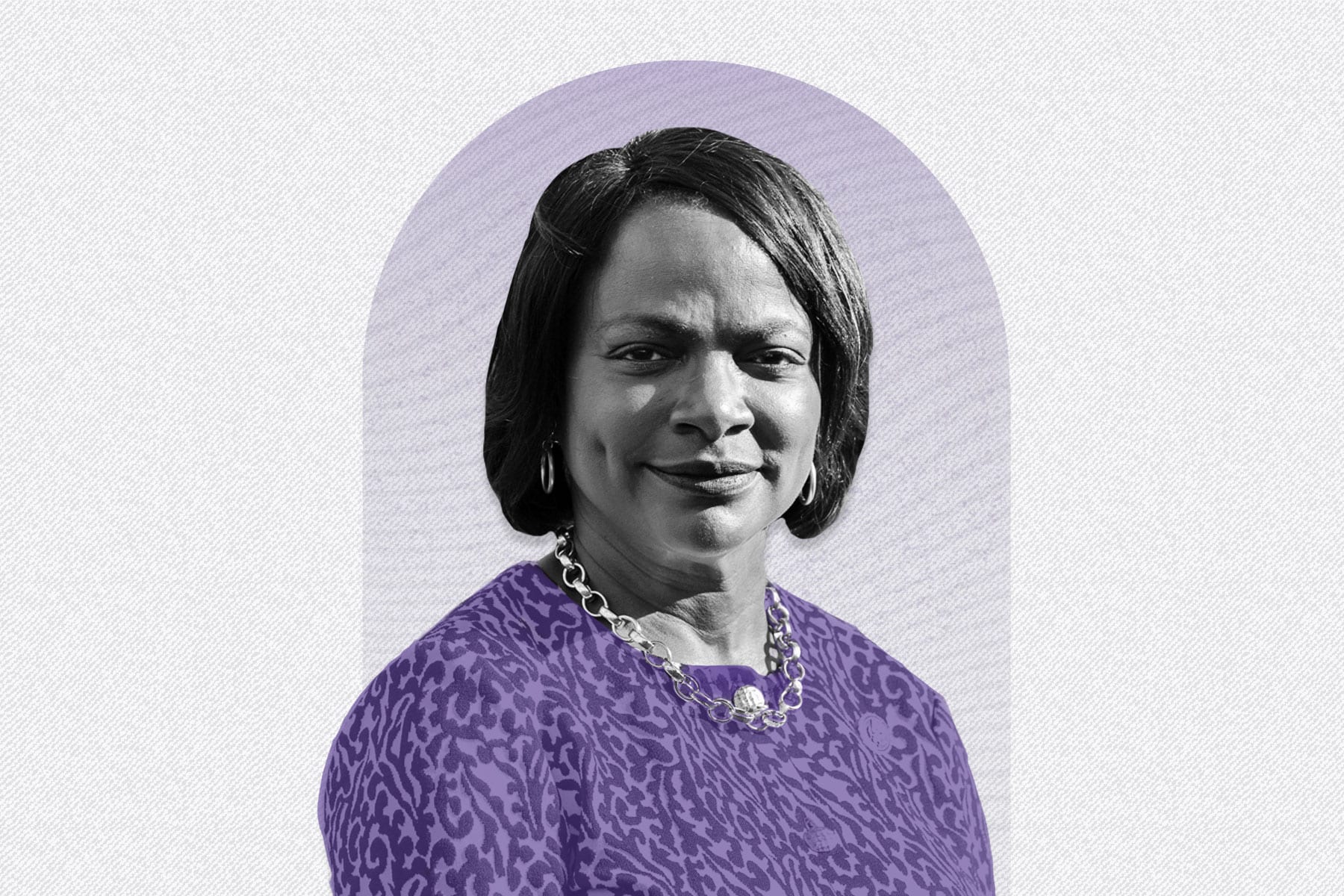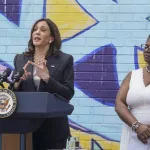Shortly after this interview was published, Politico reported that Demings plans to challenge Sen. Marco Rubio in 2022.
Florida Rep. Val Demings emerged as a national figure in December 2019 as one of the seven managers in former President Donald Trump’s first impeachment. She remained in the spotlight, from conversations around who then-Democratic presidential nominee Joe Biden would choose as his vice presidential running mate to last summer’s national reckoning over the killing of unarmed Black Americans by law enforcement and vigilantes, which highlighted Demings’ experience as the former Orlando police chief.
The three-term House lawmaker, 64, is now weighing a gubernatorial or U.S. Senate run in Florida, where Democrats keep losing statewide races by incredibly narrow margins.
There are a lot of reasons I’ve been eager to sit down with Demings.
Some of my earliest political reporting was during the 2004 presidential election, when I was a young reporter in central Florida working for the Orlando Sentinel. I’ve covered the Black Lives Matter movement since its beginnings, and the battle over voting since my days at The Associated Press in Georgia, where the state legislature’s pioneering voter ID laws began to shape a 21st century voter suppression strategy. Much of my focus for the past few years has been on Black women’s political power — as the candidates and voters helping to shape our elections and our democracy.
Demings says in the wake of national outcry over George Floyd’s murder, she’s hoping to harness momentum in Congress to reform policing. But she’s also empathetic when she talks to law enforcement officials across the country, and encourages them to take proactive measures regardless of what Congress does or doesn’t do. The issue is personal for her, which is how she winded up in a showdown with Rep. Jim Jordan last month when the Ohio Republican tried to insert a Republican talking point about defunding the police into a hearing on anti-AAPI violence legislation.
And as for the big question — is she running and for what? — spoiler alert: She’s not saying yet. But you’d be forgiven if, after reading this interview, you share my suspicion that a gubernatorial bid could be on the horizon.
Each month, I’ll be doing Q&As with key newsmakers in politics, policy and culture, getting them to explain what they’re thinking about and what they see for the future. This one’s the first, and it’s a good one. I hope you’ll come along for the ride with me — and let me know who you’d like to hear from.
This interview has been edited for length and clarity.
Errin Haines: The president and Congresswoman Karen Bass set a deadline of May 25, the one-year anniversary of George Floyd’s murder, to pass the George Floyd Justice and Policing Act. Did you have input into that bill? And what are your thoughts on whether it’s going to pass the Senate and if you see areas for compromise?
Rep. Val Demings: We have had a painful year, a year of grieving, a year of transition. I spent 27 years in law enforcement, and it was a job that I loved. I think I was able to do a lot of good things. It was a job where I feel like I grew up.
I look at what happened to George Floyd last year … I firmly believe that justice is about a person having their day in court. I believe that what Derek Chauvin did was brutal, it was senseless, and it was murder.
We had no choice but to try to look at what we could do as a legislative body to make the system better and prevent tragedies like that from happening. It hurt me in a lot of different ways. Number one, I’m the mother of three sons, and grew up with three brothers. I am a product of the Black community, I’m part of the Black community.
Under the leadership of Karen [Bass], I think she’s done a great job. And I think where we ended will certainly not be perfect — we still have a lot of work to do — but I think it is certainly a step, a major step in the right direction. It would be good if we could get that legislation passed as soon as possible.
I asked for a meeting with Sen. [Tim] Scott. (The senator from South Carolina is leading negotiations on the legislation for the Republican Party.) I wanted to have a sit-down meeting with him. He has not been available for that and said, “Well, can we get on the phone?” I’ve kind of resisted that, because I think sometimes when you’re having these very important, deep, life-changing discussions, that sometimes sitting down and communicating face-to-face is always good. I may have to settle for the phone conversation.
I started talking to law enforcement executives and just saying, “Look, we’re working out this legislation … if I was still a police chief, I probably would not want elected officials coming in saying, ‘You need to do this.’ A way to prevent that is to fix your own brokenness. Look within your own agencies, look within your own policies, that’s something that I know you probably do on a regular basis.” I know I used to.
If we establish a national training standard that would help to govern the way police departments operate, whether it’s a small agency with a small budget, I thought that was good to have. Having a national database so one officer cannot just simply walk out the door at one department pending termination or under investigation and walk into another agency, I thought that was a great idea.
On qualified immunity (which protects law enforcement officials from individual liability in certain cases), I certainly think that we need to look at accountability. The language should not say “totally eliminate qualified immunity.” We need to come to the table, on both sides of the aisle in Congress, community activists, law enforcement … and come to some agreement.
Good cops don’t like bad cops. What we have to continue to do is speak up, speak out and be a major part of the process in making things better. Sometimes when you telegraph, ‘I would concede on this,’ or ‘I would concede on that,’ then the other side says, ‘Why not?’ I think the bill in its current form, like I said, it’s not perfect, but I do think it’s reasonable. But I also think we need to continue to work together, talk together. Let’s get this passed and then go to the next thing. We’ll see what happens, but we need to get it done.
We’re now more than five months out from the January 6 insurrection. You’re a member of the House Homeland Security Committee. … Do you think the country should keep its focus on this issue of white supremacy, which has been identified as the most urgent domestic threat to our country’s national security?
For me making the transition from being a law enforcement officer to Congress, one of the frustrations has been the presence of politics into areas that certainly ought to be nonpartisan. What happened on January 6, and developing a plan so it never happens again, is one of those areas.
I was in the Homeland Security hearing on the day that FBI Director Christopher Wray said that the rise of domestic terrorism is the greatest threat facing our nation. And so it has been extremely frustrating for me to see too many of my colleagues basically ignore that. My colleagues on the other side of the aisle don’t want the public to know the truth.
Your exchange last month during a House Judiciary Committee hearing with your colleague Jim Jordan got a lot of attention. You asked him if you struck a nerve with your comments. Do you think you did? Why? And he also seemed to upset you with his comments. Did he?
I started off as a social worker before I became a law enforcement officer, and I worked with families who needed emergency services. The whole COVID-19 experience has certainly brought that back. We see people struggling to make ends meet, struggling to pay their rent, struggling to stay in their homes, worried about their children, can’t go back to work, losing their small businesses. And then I served as a law enforcement officer, and on January 6, we watched police officers being beat down with poles and pipes and anything else that the violent mob could get their hands on.
We’re dealing with some critical issues, and we should not be playing political games. We were looking at marking up a bill that dealt with the attacks against Asian Americans. And [Jordan] wanted to talk about defunding the police. I’m sitting there listening to this and I thought about all of the priorities that we have in this country that we should be dealing with. As we were sitting there having this discussion, right then and there were people who are worried about what the next minute is going to bring. I thought about Asian Americans who could have been attacked right at that very moment. And Jim Jordan chose to talk about something that wasn’t even a part of the bill, and using their usual narrative because they have no other agenda.
I am not gonna sit here and allow you now to try to utilize law enforcement as a political pawn. On January 6, I really do believe that the Trump supporters were determined to hang Mike Pence, assassinate the speaker, they were carrying multiple sets of flex cuffs, which we used to carry as law enforcement when we were working mass demonstrations and anticipated making mass arrests. So I can only assume they were planning on taking us into custody. And he wanted to play political games. No safe society can exist without law enforcement, but everybody deserves to be treated with dignity and respect.
Did I strike a nerve? I must have, because he certainly didn’t like me telling the truth about his motives and his intentions.
Last week, the governor of your state signed the latest statehouse-led GOP effort to address a nonexistent threat to election integrity. What is your reaction to that bill, and your thoughts on whether Congress is going to be able to address this kind of legislation at the federal level with the For the People Act or the John Lewis Voting Rights Act?
I remember growing up, my mother was a maid and my father was a janitor. I cannot remember a time that they did not make their way to the poll to vote. They were so committed to voting. They saw it as their constitutional duty, or patriotic duty. They realized that regardless of how much money they had in the bank, and the color of their skin, when they got to the poll and cast their vote, their vote counted as much as the richest man or woman in town.
And so for our governor, who was saying just last year that Florida’s voting system should be a model for the country to follow, that it’s damn near perfect, to turn around this year and say we need to restrict the number of drop boxes, change the ID laws, make sure that people aren’t passing out things in line … It is clearly, painfully obvious that the governor’s only intention is to restrict folks from voting.
When I think about the Voting Rights Act of 1965, and my dear friend and colleague who’s no longer with us, John Lewis, and many others who were beaten down, some who lost their lives trying to protect the right to vote — I hear my colleagues on the other side of the aisle talk about how much they loved John Lewis. Well if you love him so much, then let’s pass the John Lewis Voting Rights Act and restore those provisions so bad actors cannot restrict a person’s right to vote. We’ve done the work in the House. We need to hold the Senate accountable, and get this done so we can get this legislation to the president’s desk for his signature.
You told a local reporter in your home state earlier this month that you’re considering a run for governor or U.S. Senate in Florida. There are currently no Black women in the Senate. There has never been a Black woman governor. There has never been an African American elected statewide in Florida. You’ve already been a first in your own right as the first woman police chief in Orlando. Are these things you’re considering as you weigh your political future? Where are you on this decision?
There’s not a day here, as of late, that I am not talking to a lot of people about the decision that I will be making very, very soon. They are two very different jobs. But when we look at what our governors do … We didn’t even talk about the anti-protest bill and so many other things where he (Florida Gov. Ron DeSantis) has demonstrated that he wants to create winners and losers based on your ability to pay to play. And then we have a senator (Marco Rubio), as we talk about voting rights, as we talk about the American Rescue Plan and helping people who are in crisis, the For the People act, and so many pieces of legislation dealing with gun violence … Florida doesn’t have a senator who cares about those things. We have two very critical needs in the Senate and in the governor’s mansion. And so, you know, I am considering it, and I will be making my decision really soon.
Can a Democrat win in Florida, and if so why haven’t they? What about Biden’s relative weakness with Latinx voters, particularly with voters around Miami?
I hope there are no elected officials walking around believing that they are not beatable. At the end of the day, the people still decide. In Florida, we’ve had some infrastructure issues where we have not been as strategic, not as organized. We have waited till the last minute to put our plan in place. Walking and talking and knocking on doors, we were super inhibited from doing that in 2020. I don’t think we had a good enough backup plan.
Florida has had Democratic governors. Florida has had a Democratic senator. Let’s go back to 2010 to Alex Sink, who lost by one percentage point. Let’s go to 2014 with Charlie Crist; when he was a Democrat, he lost by one percentage point. Andrew Gillum, a Black man from small-town Tallahassee, the majority of the state did not know him, came within 32,000 votes of winning as governor. Bill Nelson came within 10,000 votes [in the Senate race].
It’s not like we’re down by double digits. We can see the horizon. This is not something that is out of reach. This is right in front of us. And I do believe we have a 67-county plan. We’re just trying to get one percentage point. I think we can do it if we get started early enough and we have a strategic plan.
We cannot leave any voter behind. We have to communicate to the voters, we have to meet them where they are. If people feel like you’re not listening to them, or they don’t see you, they don’t hear from you, they’re gonna go someplace else. Another error that we made in 2020 was that Trump and his supporters were the only ones doing the talking. And they framed Democrats as the Socialist Party, against the police, whatever. One thing I know about Latinx communities, they do care about the safety of their communities, they care about the future, depending on which part of the region they are. You know, when we talk about socialism, it matters to them. And we allowed our message to be silent and a crazy, untrue message to really be the only message out there. And I believe that every community in Florida is thirsty for leaders who really care about them and their families.
As you’re thinking about this political decision for yourself, what are the things that you see that you could potentially bring to either one of these roles?
I think we start with my background, born and raised in Florida, I’ve never lived anyplace else. I went to college in Florida. I’ve dedicated my life to public service in Florida as a social worker, a police chief, a career law enforcement officer. And now as a member of Congress, I’ve spent decades solving problems and trying to improve the quality of life for people living in my community. And I do believe if you’re faithful with a few things, God will make you ruler over many.
I’m not going to roll out vaccinations to you based on your ability to write me a check. In Florida, in the legislature, in the governor’s mansion, we have an opportunity to expand Medicaid, for example, to almost a million people. And our governors have refused to do that.
What about [State Constitutional] Amendment Four, where the voters overwhelmingly said that when convicted felons have served their time, they ought to have access to the ballot box? But our governor takes liberty to come up with a modern-day poll tax that says to get that you need to pay all of the fees and taxes that you might owe.
I’ve already talked about the U.S. Senate … We know that [House Minority Leader] Mitch McConnell said that’s the place where legislation goes to die with a smile on his face. And our senators in Florida — Marco Rubio in particular, who’s up for reelection next year — is fine with that. Come to work like you’re interested in doing the job. Support laws that will support the people that you represent like gun violence laws. Did you forget Parkland? Did you forget Pulse? We need people who really care about the people that they represent, not just the privileged few, but all of them. I believe my record of service by leadership and the desire to want to represent all people and get some things done immediately are important to Floridians. I think that is exactly the reason for me to run statewide.





